The recent passing of actress and model Shefali Jariwala has prompted widespread grief. Jariwala, known for her role in the popular early 2000s song "Kaanta Laga," reportedly succumbed to sudden cardiac arrest on June 27th, at the age of 42. Despite immediate medical attention at a Mumbai hospital, she could not be revived.
While the specific cause of death is still unconfirmed, initial reports point towards sudden cardiac arrest, a critical condition characterized by the abrupt cessation of the heart's function. This tragic event highlights the fact that cardiac arrest can affect individuals of all ages, even those without pre-existing heart conditions. Often, the body exhibits subtle indicators that, if recognized promptly, could potentially save lives.
Here are five frequently overlooked warning signs of sudden cardiac arrest:
Experiencing tiredness after physical activity is normal. However, unexplained fatigue that feels unusually intense and doesn't improve with rest should be a cause for concern. The American Heart Association identifies unexplained fatigue as a potential early symptom of heart problems, particularly in women. Some individuals who experienced cardiac arrest reported feeling drained for days or weeks leading up to the event. This fatigue may manifest as a persistent lack of energy, even when performing simple tasks like walking or climbing stairs.

Image: A person feeling extreme fatigue.
Contrary to popular belief, cardiac events don't always begin with intense chest pain. Instead, they often manifest as a subtle sensation of tightness, fullness, or discomfort in the chest. This is especially common in women and individuals under 50, where symptoms may differ from the classic crushing chest pain. Some describe it as a feeling of heaviness or pressure. It's crucial not to dismiss these sensations as mere gas, muscle strain, or stress. If the feeling appears suddenly or worsens with exertion, it could indicate that the heart isn't receiving sufficient oxygen.
An elevated heart rate following exercise or stress is expected. However, an unusually fast, slow, or erratic heartbeat without any apparent trigger warrants medical evaluation. This condition, known as arrhythmia, is frequently observed in individuals before a cardiac arrest. It can manifest as palpitations, or a fluttering sensation in the chest. In some instances, it may be asymptomatic and only detectable through medical testing. It is particularly concerning when these rhythm disturbances occur during rest or sleep, or when accompanied by dizziness or shortness of breath. This suggests that the heart's electrical signals are malfunctioning, a crucial factor in cardiac arrest.

Image: Illustration of irregular heartbeats.
Shortness of breath isn't always related to lung issues. In many cardiac arrest cases, individuals experience a disproportionate shortness of breath. This can occur even when at rest or engaging in light activity. Sufferers may feel like they cannot fully catch their breath, despite their lungs functioning normally. In some instances, it may be accompanied by mild chest discomfort or lightheadedness. This occurs because a weakened heart struggles to pump effectively, resulting in decreased oxygen supply and breathing difficulties.
While occasional dizziness can occur due to various benign reasons, sudden and unexplained dizziness, particularly when accompanied by nausea, sweating, or paleness, should be taken seriously. Cardiac arrest often results in reduced blood flow to the brain. When the heart cannot pump adequately, the brain detects the deficiency, leading to dizziness, confusion, or even temporary loss of consciousness. Many individuals who experienced cardiac arrest reported having fainted or felt faint in the days prior, without associating it with heart-related issues. These episodes can serve as silent indicators, particularly for those without a history of such occurrences.
Disclaimer: This article is intended for informational purposes only and does not constitute medical advice. Always consult with a qualified healthcare professional for any health concerns or before making any decisions related to your health or treatment.
Newer articles
Older articles
 Esha Gupta Sets Record Straight: Actress Addresses Hardik Pandya Dating Rumors
Esha Gupta Sets Record Straight: Actress Addresses Hardik Pandya Dating Rumors
 Google Maps to Boost Navigation Accuracy with Fused Orientation Provider API
Google Maps to Boost Navigation Accuracy with Fused Orientation Provider API
 Global Vaccination Rates Plunge: Millions of Children Now Vulnerable to Preventable Diseases
Global Vaccination Rates Plunge: Millions of Children Now Vulnerable to Preventable Diseases
 Rishabh Pant: Greg Chappell Hails India Star as Cricket Revolutionary
Rishabh Pant: Greg Chappell Hails India Star as Cricket Revolutionary
 Skin Cancer Alert: How to Identify Suspicious Moles and Early Warning Signs
Skin Cancer Alert: How to Identify Suspicious Moles and Early Warning Signs
 Gavaskar Calls for Kuldeep Yadav's Inclusion in Second Test Amid Bumrah Fitness Concerns
Gavaskar Calls for Kuldeep Yadav's Inclusion in Second Test Amid Bumrah Fitness Concerns
 Is Daily Pooping a Must? Understanding Bowel Regularity and When to Worry
Is Daily Pooping a Must? Understanding Bowel Regularity and When to Worry
 Suryakumar Yadav's Sports Hernia: Understanding the Injury, Recovery, and Risk Factors for Athletes
Suryakumar Yadav's Sports Hernia: Understanding the Injury, Recovery, and Risk Factors for Athletes
 Vijay Sethupathi Apologizes Amid Controversy Over Son Surya's Debut Film 'Phoenix' and Alleged Video Removal Pressure
Vijay Sethupathi Apologizes Amid Controversy Over Son Surya's Debut Film 'Phoenix' and Alleged Video Removal Pressure
 Install Baccarat Hack Tool: The Secret to Winning
Install Baccarat Hack Tool: The Secret to Winning